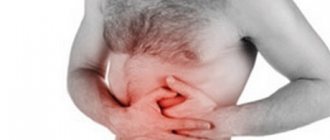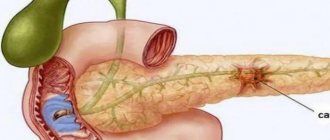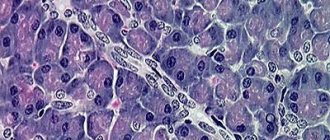Lipase is an enzyme that is involved in the complex process of fat digestion in the human digestive tract. Thanks to this enzyme, they are separated into fractions, emulsified and subsequently split. After this, fats become available for absorption and enter the body’s bloodstream, from where they are distributed to tissues. It is also involved in the absorption of fat-soluble vitamins (A - D - E - K) and the metabolism of polyunsaturated fatty acids.
In order to correctly determine whether a patient has elevated lipase in the blood, it is necessary that he does not eat food 12 hours before taking the biomaterial.
Half an hour before the test, you need to make sure that the patient does not experience strong emotional turmoil and does not perform excessive physical activity, as this can affect the test result by temporarily changing the amount of enzyme in the blood. For the study, venous blood is taken.
Detailed description of the study
Pancreatic lipase is a water-soluble enzyme that catalyzes the reactions of digestion of neutral fats (triglycerides) in the initial part of the small intestine - the duodenum. The biochemical feature of lipase is that this enzyme can perform its function without coenzymes - derivatives of vitamins, nucleotides, heme, etc.
The process of digestion of triglycerides begins in the lumen of the stomach with the help of lingual lipase, which is produced in the glands of the tongue and enters the stomach along with saliva. However, the main stage of digestion of neutral fats begins in the small intestine. Pancreatic lipase is formed in the pancreas and, as part of pancreatic juice, is secreted through the duct into the lumen of the duodenum together with colipase. This protein indirectly accelerates the action of lipase, so that fats begin to break down faster.
Before digestion, fats sequentially pass through the emulsification stage. Bile produced in the liver directly produces this process - the integrity of the neutral fat molecule is disrupted, as a result of which triglycerides are repeatedly mixed with water in the lumen of the small intestine and crushed into small fat droplets. After this, the process of hydrolysis begins with the participation of pancreatic lipase.
With pancreatitis, the outflow of pancreatic juice into the duodenum is disrupted. The large amount of lipase and other enzymes remaining in the gland, which have pronounced biological activity, leads to inflammation of the “self-digestion” type - the enzymes destroy the anatomical structure of the pancreas and become the main cause of the development of inflammation. In this case, a significant part of the lipase begins to enter the blood. In addition, lipase together with calcium leads to extensive damage to the pancreas (pancreatic necrosis).
Another enzyme, alpha-amylase, is also a marker of pancreatitis. This protein is formed in the cells of the salivary glands and pancreas; it is involved in the hydrolysis of carbohydrates. With pancreatitis, the pancreatic form of amylase in the blood increases, and salivary amylase levels remain within normal values. Accordingly, hyperfermentemia (increased lipase or amylase in the blood) by more than three times is one of the key signs of acute pancreatitis.
In the context of diagnosing acute pancreatitis, lipase is a more specific enzyme than amylase. An increase in the level of lipase in pancreatitis is observed approximately 4-8 hours after the onset of the disease, amylase - 2-12 hours. In this case, the level of lipase in the blood, as a rule, increases to a greater extent and can remain elevated much longer compared to amylase (7-10 days / 3-4 days). It has also been found that in about 20% of patients, the concentration of serum amylase can remain within normal limits. This property is not typical for lipase.
Also, the level of serum pancreatic lipase may be increased in diseases of the hepatobiliary region and systemic diseases leading to secondary damage to the pancreatic gland.
What to do if lipase levels are elevated
If a patient has elevated lipase levels, they should consult a doctor, as this may be a sign of serious health problems that should only be treated under the supervision of a qualified physician.
In some cases, changes in enzyme levels may be associated with other factors, such as taking corticosteroid hormones and certain non-steroidal anti-inflammatory drugs (ibuprofen), captopril, oral contraceptives, loop diuretics, non-narcotic analgesics and heparin. Therefore, when receiving the result, you need to tell the doctor in detail whether the patient is taking any medications in order to exclude an erroneous diagnosis.
Lipase release
The pancreas secretes a certain amount of enzymes, including lipase , necessary to break down a certain amount of food. If there are any malfunctions in the established mechanism (excessively large portions of food, too fatty foods, diseases associated with the secretion of secretions), it turns out to be unprepared for a corresponding change in the level of produced enzymes. And the person faces a number of unpleasant symptoms. Foods that should be excluded from your diet: TOP 12 most harmful foods.
There are two points of view:
- the pancreas produces a lipase , which subsequently activates the enzyme;
- lipase is activated by salts of conjugated bile acids.
After splitting, the fat is quickly absorbed. Literally after 10-30 minutes, drops of absorbed fat are found in the intestinal epithelium.
Systematic disturbances in the digestive processes can also manifest themselves externally:
- dry skin;
- acne;
- brittle nails;
- dermatitis;
- obesity.
Due to a lack of essential vitamins and microelements, hair also grows poorly, becomes brittle, and loses its shine.
Taking Pancreatin to compensate for lipase
Enlarge image
In order for food to be completely digested and all the necessary substances to be absorbed by the body, a sufficient amount of enzymes is required:
- lipases;
- amylase;
- trypsin;
- chymotrypsin.
If there are not enough of them, the person requires replacement therapy. One of the most effective drugs is Pancreatin. It helps in the breakdown of carbohydrates, proteins and fats, and is used in the treatment of pancreatitis. With its help, digestion processes are normalized, and the functional state of the gastrointestinal tract is improved.
On a note! Pancreatin is an international nonproprietary name (INN). Therefore, many manufacturers can produce it under the same name, because The name "Pancreatin" does not belong to anyone.
Application of lipase
Enlarge image
Lipase is one of the active components of enzyme preparations. Used to normalize digestive processes and regulate the functioning of the pancreas. Most often, lipase of animal origin is used in such preparations:
- veal;
- goat;
- lamb
Some preparations contain lipase of plant origin.
Lipase is most often used in combination with other enzymes in replacement therapy. Indeed, if there is a digestive disorder, the patient not only complains of pain and poor health, but also does not receive all the necessary substances from the food they eat. And fats in the diet, broken down by lipase , are the main source of energy, vitamins A, D, E, K, and a stimulator of brain activity.
So why does the body of many people not burn excess fat on its own, but store it? The whole reason is sugars (carbohydrates). When consuming “sweets,” the body begins to actively produce insulin, which forms a certain barrier that prevents the production of lipase .
Pancreatin: at the pharmacy
In any pharmacy in Moscow and St. Petersburg you can find a variety of drugs containing lipase . Manufacturers promise an almost instant effect. Or vice versa, you need a lot of pills and take them for a very long time. And many people have long noticed that conventional drugs do not always give the expected effect. There are good drugs in pharmacies, but many people prefer to order dietary supplements on iHerb.com, because... All products are shipped from warehouses in the USA. And here many people from Russia and 150 countries around the world regularly place orders for various herbal supplements and vitamins. When purchasing dietary supplements and sports nutrition from iHerb, you can be confident in its quality and originality. iHerb works only with trusted manufacturers.
All products are purchased, stored and delivered in accordance with all GMP and manufacturer safety requirements. Humidity and temperature conditions are regularly monitored. Absolutely all additives have documents confirming the quality of the products.
Lipase: effect on the body
Enlarge image
When fats (animal or vegetable origin) enter the mouth of an adult with food, they do not undergo changes. And they come out of the stomach in almost the same form. Although the gastric juice contains lipase , its concentration is quite low. And the pH for enzyme activation is far from normal (5.5 - 7.5). It does not break down fats in the stomach, but greatly simplifies their further digestion in the intestines.
It's a different matter for infants. In response to sucking and swallowing movements, lipase , which helps quickly deal with the lipids contained in milk.
When chyme (semi-digested food) enters the small intestine, gastric acid is neutralized, after which the final fractionation of fat begins.
Some vegetables and fruits contain lipase . These foods are easier to digest and even help get rid of “bad fat” in the body. These include:
- avocado (avocado oil and fresh fruits);
- flax seeds;
- pumpkin seeds;
- nuts.
All these foods should be consumed raw.
Pancreatin: instructions
The enzyme preparation is often used in gastroenterology. It facilitates the digestion of food and promotes better absorption of essential vitamins and microelements in the small intestine. Since the enzymes contained in the product lose activity when exposed to gastric juice, the medicine is available in the form of tablets or capsules coated with a special coating. It is destroyed in the intestines, activating enzymes.
How to use
Enlarge image
How and in what quantities to use the drug depends on the dosage, age of the patient, diagnosis, form of release and other factors. It is better if the prescription is made by a doctor after all the necessary examinations.
Important! Preparations containing digestive enzymes are taken with meals or immediately after meals, unless otherwise indicated in the instructions.
The recommendations for the dosage form of the specific drug used, indications for use and dosage regimen should be strictly followed. The daily dose for an adult is 150,000 units/day. The duration of treatment depends on the disease and can vary from several days and even up to several years.
Main signs of pancreatic enzyme deficiency
Identifying enzyme deficiencies is quite simple. The key symptoms are heaviness after eating, a feeling of fullness in the abdomen and abdominal discomfort. Often these symptoms are accompanied by bloating, rumbling, flatulence, and diarrhea. Most often, such symptoms can occur in ordinary situations: when eating heavy, fatty foods or when overeating, when it was simply impossible to resist eating a lot of tasty dishes. In this case, you should not be afraid of problems with the pancreas or other gastrointestinal diseases. The pancreas simply cannot cope with much work and may need help.
Why does diarrhea occur? Fats are the most difficult components of food to digest. If there is a lack of enzymes in the body, it is with the processing of fats that difficulties arise. As a result, undigested fats that are not decomposed by enzymes contribute to a change in the nature of the stool and the rapid movement of contents along the intestines, which provokes diarrhea8.
If a lack of enzymes and digestive problems persist for a long time, then this does not go unnoticed by the body. Symptoms may worsen and become regular rather than episodic. Constant diarrhea gives rise to vitamin deficiency; protein-energy deficiency and dehydration throughout the body can develop. Significant weight loss may occur. In addition, in severe stages, the following symptoms of pancreatic enzyme deficiency may be observed8:
- nausea and vomiting;
- heartburn;
- a sharp decrease in appetite;
- general weakness.
Decreased lipase
Enlarge image
Not only an increased level of lipase in the blood serum can indicate pathological processes in the body. A reduced concentration of the enzyme warns of irreversible damage to pancreatic cells. Enzyme deficiency leads to malabsorption and is manifested by abdominal pain and fatty stools, because fat-soluble vitamins are not fractionated and are poorly absorbed in the intestines.
The most common causes of low lipase in men and women:
- gastrointestinal cancer (except pancreatic carcinoma);
- poor diet (excess fatty foods) and hereditary hyperlipidemia;
- cystic fibrosis;
- postoperative period after pancreatectomy;
- exocrine insufficiency.
In infancy, low levels of the enzyme are considered normal in children.
Normal blood lipase
- from 0 days: 0 – 70 units.
- from 1 years: 0 - 100 units.
- from 10 years: 0 – 130 units.
- from 18 years old: 0 – 190 units.
For a more accurate diagnosis, the lipase is often done with the amylase test. This helps differentiate between acute and chronic pancreatitis if there is any doubt.








